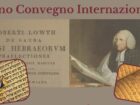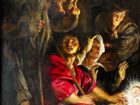Solomon’s knot is a decorative motif found as much in synagogues as in churches of the first centuries of our era.
It has also been taken up in the Muslim world where it bears the same name: ‘uqdat sayyidnâ Sulaymân.
In its simplest form, Solomon’s knot consists of two intertwined rings in which some authors recognize a symbol of covenant, particularly between earth and heaven.
There are also more elaborate forms of this same knot. A complex form of Solomon’s knot has been chosen as the logo of the series “Rhétorique sémitique”; the knot is indeed present in the cultural areas of the Judaic, Christian and Muslim texts that are studied and analyzed in the series.
The knot is a symbol of the enigma.
Now every text is an enigma that must be deciphered, a knot that must be untied.
Only the wise man is capable of solving enigmas.
And it is precisely for this reason that the name of Solomon the Wise has been associated with the image of this seemingly insoluble knot.
Read again the account of the most famous enigma solved by the divine wisdom of King Solomon, son of David: First Book of Kings 3,5-28
5 In Gibeon the Lord appeared to Solomon in a dream during the night and said to him, “Ask me what I must grant you.” 6 Solomon said, “You treated your servant David my father with great kindness, because he had walked before you faithfully, righteously, and with a righteous heart toward you. You preserved this great kindness for him and gave him a son to sit on his throne, as is the case today. 7 Now, O Lord my God, you have made your servant to reign in place of David my father. Well I am a boy; I do not know how to rule. 8 Your servant is in the midst of your people whom you have chosen, a people so numerous that they cannot be calculated or counted. 9 Give your servant a meek heart so that he may know how to do justice to your people and know how to distinguish good from evil, for who could govern this people of yours who are so numerous?” 10 It pleased the Lord that Solomon had asked for wisdom in ruling. 11 God said to him, “Because you have asked this thing, and have not asked for yourself long life, nor riches, nor the death of your enemies, but have asked for yourself discernment to hear the causes, 12 behold I do as you have said. Behold, I grant thee a wise and intelligent heart: like thee there was none before thee, nor shall there arise after thee. 13 I will also grant you what you did not ask for, namely, wealth and glory such as no king ever had. 14 If you will walk in my ways, keeping my decrees and my commands, as your father David did, I will prolong your life. 15 Solomon awoke; behold, it had been a dream. He went to Jerusalem; before the ark of the Lord’s covenant he offered burnt offerings, made communion sacrifices, and gave a banquet for all his servants.
16 One day two prostitutes came to the king and stood before him. 17 One of them said, “Listen to me, sir! This woman and I live in the same house. I gave birth while she was alone in the house. 18 Three days after I gave birth, this woman also gave birth; we are together, and there is no stranger in the house except us two. 19 This woman’s son died during the night, because she lay on him. 20 She got up in the middle of the night, took my son from my side – your slave was sleeping – and put him in her bosom, and on my bosom she put her dead son. 21 In the morning I got up to nurse my son, but behold, he was dead. I looked at him closely; behold, he was not the son I had borne.” 22 The other woman said, “That is not true! My son is the living one; yours is the dead one.” And the one, on the contrary, said, “It is not true! The dead one is your son, mine is the living one.” They argued thus in the presence of the king. 23 He said, “She says, ‘My son is the living one, yours is the dead one,’ and she says, ‘It is not true! Your son is the dead one, and mine is the living one. 24 Then the king ordered, “Get me a sword!” They brought a sword into the king’s presence. 25 Then the king added, “Cut the living child in two and give one half to the one and one half to the other.” 26 The mother of the living child turned to the king, for her insides had been moved by her son, and she said, “Sir, give her the living child; do not kill him at all!” The other said, “Let him be neither mine nor yours; divide him in two!” 27 Taking the floor, the king said, “Give the first one the child alive; do not kill him. That is his mother.” 28 All the Israelites heard of the sentence pronounced by the king and conceived respect for the king, for they had seen that God’s wisdom was in him to render justice.



